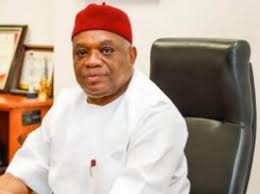Write Second Book — Senator Kalu Tells Former President

By Babagana Jidda
Kanempress
March 4, 2025
Senator Orji Uzor Kalu has come to the defense of former military president Ibrahim Babangida, asserting that Nigerians have been unjust in their criticism following the release of Babangida’s memoir, A Journey in Service: An Autobiography. Kalu praised Babangida for his courage in addressing long-held national grievances, including the annulment of the 1993 presidential election and the controversial 1966 military coup.
In a recent appearance on Channels Television’s “Politics Today,” Kalu remarked, “I think Nigerians are very unfair to Babangida because he came out on his own.” He further suggested that Babangida should pen a sequel to his memoir, delving deeper into the roles of other military officers during the 1993 election crisis. Kalu emphasized that a more comprehensive account would provide a fuller understanding of the events that transpired.
The release of Babangida’s 420-page autobiography has indeed stirred national discourse. Notably, the book confirms that Chief MKO Abiola won the 1993 presidential election—a victory that was subsequently annulled—sparking a range of reactions. Some critics argue that Babangida’s admission comes too late to effect meaningful reconciliation. However, others commend him for his honesty, suggesting that acknowledging past mistakes is a vital step toward national healing.
Legal expert Mike Ozekhome praised Babangida’s humility in admitting the wrongs of his administration, highlighting the traumatic impact of the June 12 annulment on Nigeria’s democratic journey. Ozekhome noted that such candor is rare and should be acknowledged positively.
Former President Olusegun Obasanjo, who chaired the book launch, advised Babangida to expect a spectrum of reactions—both positive and negative—to the memoir. Obasanjo viewed this as indicative of the book’s impact and the public’s engagement with its content.
Kalu also addressed longstanding ethnic narratives, refuting claims that the 1966 military coup was an “Igbo coup.” He stated, “The coup in question was not an Igbo coup; it was a Nigerian coup, executed by the military.” This perspective aligns with Babangida’s portrayal in his memoir, aiming to dispel enduring myths and promote national unity.
In summary, Senator Kalu’s defense of Babangida underscores a broader conversation about historical accountability and reconciliation in Nigeria. While opinions on Babangida’s memoir vary, it undeniably serves as a catalyst for reflecting on the nation’s complex political history and fostering discussions that could pave the way for healing and progress.

